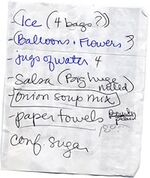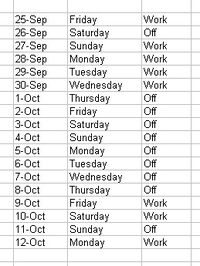Writing
“It's my fucking thing.”
Writing used to be the act of removing excess ink from a pen or typewriter ribbon by marking one or more sheets of paper with complete sentences from your chosen language. In contemporary usage, writing is the primary means of preventing screen burn (a computer screen freezing from inactivity). In either case, literature, a coherent string of text, is a coincidental byproduct of the process. However, this side-effect occurs distressingly often and, if unchecked, can lead to publication. This, in turn, may cause widespread entertainment, learned discourse, cultural enhancement, and other forms of effluence that distract the proles from their dreary lives, which then in turn causes computers to freeze.
History

While the history of writing hasn’t been very well documented, some historians believe that writing was first invented in ancient Egypt, with the hieroglyphs. This view however is still commonly challenged as hieroglyphs are art, not literature (most agree there is a distinction). The more commonly accepted birthday of writing is with William Shakespeare (or Robert Burns, as he is known in Scotland) and his infamous love poems (such as Roses are Red and Shall I Compare Thee).
Regardless of its origins it is widely accepted in society, that literature was first brought into the public eye some two hundred years ago, with the publication of Charles Dickens’ first novel, Oliver Twist. However, some historians believe they have found a book that is nearly as old as the earth (approx six-thousand years), this claim, if proven, would blow all accepted views out of the water.
Regardless of its origins, writing's popularisation in the 1800s led to some people using the idea to document their lives in books known as “diaries”, which has, among other things, given historians vital insight into how terrible it was being a prostitute in the 1990’s or a girl in Nazi Germany. Some people have taken after Dickens and written their own "pseudo-diaries" that people read for entertainment, which often contain fanciful themes (such as being a boy wizard).
Nowadays, writing has become a huge part of our lives at work, or if you are a novelist (most agree there is a distinction), where people now have to fill out lengthy business reports and spreadsheets and things. Inventively, it can also be used as a more civilised way of communicating discontent between family members using letter-shaped magnets that can be rearranged into words (e.g. "Eugh! I told you to stop putting breast milk in the empty cartons!"). In certain people, however, writing is an almost involuntary habit where they feel compelled to write down their thoughts and post them on the internet. In light of this disorder many scientists agree that the invention of reading (a way of deciphering writing into something intelligible) could help psychologists work out a cure.
Genres of Writing
There are literally two common genres of writing in today’s world. These are The Report, usually written by a man, reporting the events of a business trip to his boss, and The Fantasy, usually written by a man, who would be reporting the events of a business trip if he had a boss. Examples follow:
The Report
| “ | For dinner I had a course of cow meat (also known as beef) and an apple crumble with custard for dessert with two glasses of red wine, something which I am entitled to claim expenses for (see attached expense claim). I then had eight subsequent beers to no charge of you, the employer (see attached expense claim). Now sufficiently intoxicated I hired a prostitute and brought her back to the hotel room for intercourse to no charge of you, the employer (see attached expense claim). After an enjoyable but ultimately vapid round of sexual relations, said prostitute offered me a line of cocaine which I accepted to no charge of you, the employer (see attached expense claim). In the morning I was incapacitated and therefore unable to attend the conference, thus defeating the purpose of the excursion to some cost to you, the employer (see attached expense claim). | ” |
The Fantasy
| “ | While I was eating my course of lovely, roasted, scrumptious cow meat (also know as beef) I made eye contact with the sexy and attractive young waitress and imagined her sliding on the hard, wet, slick, shiny floor she was walking on and covering the fat man (who would look like my boss, if I had one) and his wife in gravy. After my main course, the waitress whom I had imagined having an accident took away my plates. As she returned with my dessert she slipped on the hard, wet, slick, shiny floor and, in an ironic turn of affairs, covered me in my own custard pudding... | ” |
And so on. As you can see, fantastical versions of events are much less direct with their information and may indeed be complete falsehoods. Instead of calling a spade (or shovel) a spade (or a shovel), fiction writers would have the reader believe that a spade (or shovel) is actually a “long thin device with a handle at the top and thin piece of metal at the bottom that is shaped like the Ace of Spades (or Shovels), used for cutting through the earth (or sand) to create a hole” and not a spade (or shovel). Some scientists have put this down to to the forgetting of a certain incriment of language used to name things, objects, and places.
Writer's Block
Writer’s block is a psychological deficiency where one physically cannot write, either coherently or at all. It differs from illiteracy in that the subject has learned the art of writing but has meagrely lost the will to, or (in extreme cases) forgotten entirely. This ailment can affect either the common office drone or the struggling fictionist; however, the results are usually different.
The office worker will, at first, try to hide the problem, in the hope that it is just a blip, much like the denial stage of alcoholism. To do this he will use several smokescreens, the most common being to photocopy lots and lots of his old work which, actually, has the interesting effect of making him look ‘’more’’ productive. Until he is rumbled, of course. Then he will more often than not be given the option of involuntary retirement, without pension.
In a way the reverse happens to the struggling fictionist struck down by writer’s block. However he too will first use attempt a cover-up (common ways include: fleeing the country, claiming to be on sabbatical and Photocopying lots and lots of his old work and trying to pass it off as original). Once the subject realises he is unable to write anything a publisher will accept, he will, more often than not, turn to pharmaceuticals and narcotics, and occasionally even alcohol, but they tend to be more interested in drinking it rather than selling it.
The Future
While the Americans are still in the very early stages of writing culture, they were the first to discover that traditional writing tools do not work in space, and so have poured millions of dollars into the development of a “space-pencil” (or as the rest of the world calls it, a laptop).
If the current trends in writing continue, it is possible that writing could become just as popular as the drawings in Ancient Egypt. Future generations may even be grateful for the entertainment, learned discourse, and cultural enhancement that we generate through writing today. Or they may be too busy creating their own, what with the advances in blogging and direct from brain downloads and Nintendos and things, it could become as easy and as well taught as breathing.
| Featured version: 23 June 2009 | |
| This article has been featured on the main page. — You can vote for or nominate your favourite articles at Uncyclopedia:VFH. | |



